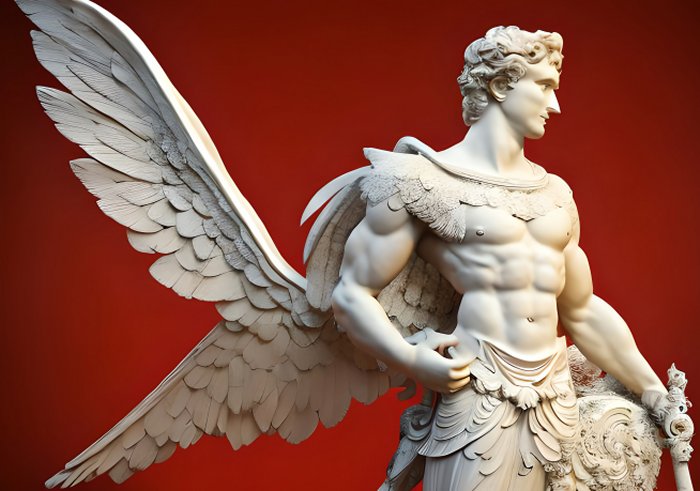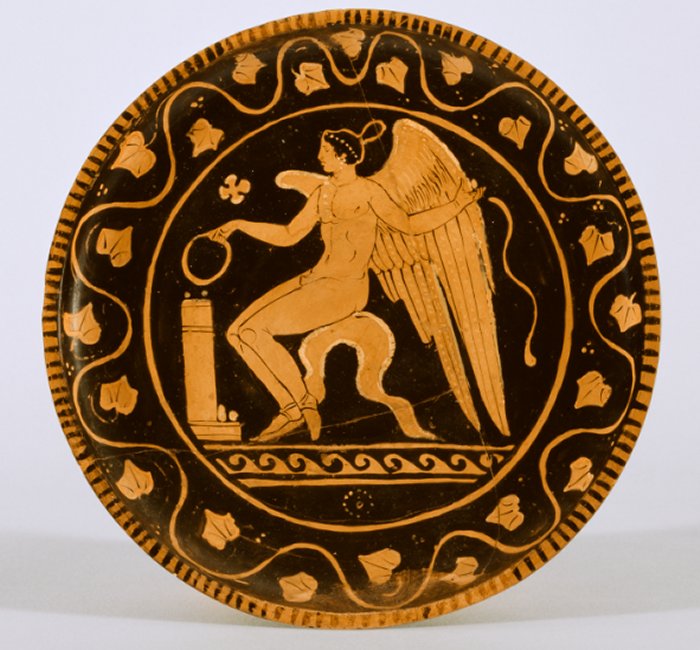Eros: Remarkable Greek God And One Of Those Who Created Everything That Exists Today
A. Sutherland - AncientPages.com - Cupid/Eros is no doubt the most popular of all the Greek gods. Eros's Roman counterpart is Cupid. We believe we know the genesis of this remarkable god's existence, but perhaps, we are wrong.
Eros in Greek mythology the god of love. Adobe Stock - Pixel Matrix
His origin has different versions; his mysterious existence changed many times. We know that no matter if we call him Eros or Cupid, this deity has always had power over us.
Who is Eros, and what does he look like? We have seen him as a playful, beautiful little boy with wings, flying around on wings like butterflies. Later, he was depicted carrying a lyre or bow and arrow, accompanied by flutes, dolphins, roses, and a torch. In some versions, Eros was a great and powerful god older than Zeus and Kronos, the leader and youngest of the first generation of Titans.
Was he one of the original primordials? Perhaps Eros (meaning 'Cupid' in Latin) symbolizes both these figures, depending on the time in the history of humankind.
Eros Stringing the Bow. Marble creation. Roman copy after a Greek bronze original by Lysippos of the 4th century BC. Image source: Rome, Capitoline Museums, Palazzo Nuovo, Gallery.
In later accounts, he was described as one of the children of Aphrodite and Ares. He was the god of love, and inseparable companion and assistant of Aphrodite, the personification of love attraction, ensuring the continuation of life on Earth.
Zeus foresaw his evil nature and wanted to kill him immediately after birth. Aphrodite, however, became aware of Zeus' dangerous plan and hid the newborn child in the forests, where he fed on the milk of a lioness and a tigress.
In the Theogony' (c. 700 BC), one of the most ancient Greek sources, and the first written cosmology of the Greek gods, Eros is the fourth god to appear, after Chaos, Gaia (the Earth), and Tartarus. He is a primordial god of love and sexual passion.
Diotima of Mantinea, a prophetess or priestess from Mantinea, the region in Arcadia, Greece, probably represents the name or pseudonym of an ancient Greek figure in Plato's dialogue "Symposium."
She is believed to have lived circa 440 BC.' According to Diotima: "Eros was the son of wealth and poverty, he was conceived on Aphrodite's birthday, so he is her companion and servant…"
In Plato s 'Symposium,' Diotima is also mentioned, saying that Eros was 'a demon halfway between god and man.'
Interestingly, Homer does not mention Eros, but to Parmenides (c. 400 BC), one of the pre-Socratic philosophers, Eros was of great importance and was considered the first of all the gods to come into existence.
In the 5th century BC, Parmenides writes of "cosmic erosion" as a force reconciling contradictions. This philosopher considered Eros to be omnipotent.
Androgynous Eros with a Maenad (around -330). Musée d'Agrigente. Image credit: Codex - CC BY-SA 4.0
Thus Eros was regarded as the oldest god, born of chaos, along with Earth and Heaven. In fact, it is not even known whether he was the patron of what is still today identified with this god. A long time ago, he was worshiped as an unworked boulder. But later generations of Greeks gave this deity a different dimension, under which we know it in modern times.
Disappointed in their love, some individuals still believe that Eros is a simple joke and even accuse him of piercing their hearts with a poisonous arrow. The same arrow, Eros also used once to connect the gods to married couples.
However, most have praised him for contributing to a much more interesting, colorful life with beautiful, sometimes painful feelings.
Eros has a tremendous power to dominate the moral world of people and gods, controlling their hearts and will.
Cupid/Eros continued to be a popular figure in the Middle Ages, and under the strong influence of Christianity, he often had a dual nature as both heavenly and earthly love. A renewed interest in classical philosophy in the Renaissance endowed him with complex allegorical meanings.
Plate with Eros; 340–320 BC; red-figure terracotta; 5 × 24.4 cm; Walters Art Museum, Baltimore, US) – Public Domain
In modern popular culture, Cupid/Eros is depicted drawing his magical bow to increase his power of influence, inspiring romantic love during Valentine's Day.
Eros and Psyche is no doubt the greatest love story in Greek mythology. It has inspired countless writers, poets, and even filmmakers. Psyche, a beautiful mortal princess, was so beautiful that the devotees prayed to her, forgetting about Aphrodite.
The story tells that Eros and Psyche experienced great happiness together night after night. The jealous and angry goddess called her son and told him to awaken passionate and blind love for the ugliest monster on Earth.
But Eros, captivated by the beauty of the princess, fell in love with her himself. He gave her a beautiful palace and visited his mistress every night. He only asked Psyche for one thing: she would never try to see him in the lamp's light. He even threatened that she would be punished with days of misery if she didn't listen. Psyche, however, had sisters who, jealous of the wealth and splendor she was experiencing, tried to convince her that her mysterious lover was probably a terrible dragon who wanted to hide this fact under cover of obscurity.
The Abduction of Psyche (1895 - William-Adolphe Bouguereau (1825–1905) - Public Domain
Finally, she couldn't resist her curiosity, and while Eros was sleeping, she lit an olive lamp and went to bed to find out who her admirer was. She saw a beautiful boy, and his beauty struck her to such an extent that her hand holding the lamp trembled with emotion, and a drop of hot oil dripped onto the naked arm of god.
Then Eros woke up and disappeared along with his beautiful palace. He left Psyche alone on a naked rock. She wandered the Earth, looking for her lost love. She was tired and disappointed because no gods wanted to help her. Finally, she decided to approach Aphrodite and ask for help. The great goddess took revenge and punished the princess, whose beauty was disturbing and challenging to accept. She decided to impose a series of challenging tasks on Psyche, which she successfully could achieve but only through supernatural assistance.
Eros still loved Psyche and carried her help and comfort. Eventually, Zeus took pity on the couple and took Psyche to Olympus, where she could marry Eros and stay with him forever.
Updated on January 18, 2024
Written by – A. Sutherland - AncientPages.com Senior Staff Writer
Copyright © AncientPages.com All rights reserved. This material may not be published, broadcast, rewritten or redistributed in whole or part without the express written permission of AncientPages.com
Expand for referencesReferences:
Tanner, Ross. Greek Mythology
Kalogeraki S. Eros: Love-life in Ancient Greece
Walsh, Nicos. Greek Mythology
More From Ancient Pages
-
 Magnificent Ancient Rock-Cut Lycian Tombs Of Myra, Antalya, Turkey
Civilizations | Aug 9, 2015
Magnificent Ancient Rock-Cut Lycian Tombs Of Myra, Antalya, Turkey
Civilizations | Aug 9, 2015 -
 Oh, Whistle, And I’ll Come To You, My Lad – A Christmas Ghost Story
Christmas Traditions | Dec 24, 2021
Oh, Whistle, And I’ll Come To You, My Lad – A Christmas Ghost Story
Christmas Traditions | Dec 24, 2021 -
 Seppuku: Ancient Suicide Ritual That Guaranteed Honorable Death Instead For Life In Shame
Ancient Traditions And Customs | Mar 8, 2018
Seppuku: Ancient Suicide Ritual That Guaranteed Honorable Death Instead For Life In Shame
Ancient Traditions And Customs | Mar 8, 2018 -
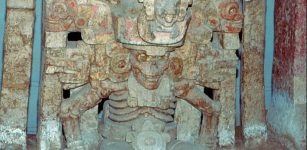 Mictlan – Underworld Realm Of The Dead In Ancient Aztec Beliefs
Aztec Mythology | Jul 2, 2018
Mictlan – Underworld Realm Of The Dead In Ancient Aztec Beliefs
Aztec Mythology | Jul 2, 2018 -
 Beautiful Ancient City Of Polonnaruwa With Hundred Of Tombs, Temples And Statues
Civilizations | Nov 12, 2018
Beautiful Ancient City Of Polonnaruwa With Hundred Of Tombs, Temples And Statues
Civilizations | Nov 12, 2018 -
 Igaluk – Powerful Eskimo Moon God That Directs Natural Phenomena
Featured Stories | Feb 13, 2019
Igaluk – Powerful Eskimo Moon God That Directs Natural Phenomena
Featured Stories | Feb 13, 2019 -
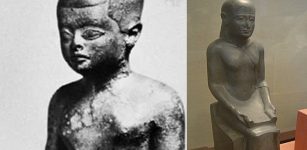 Imhotep: Ancient Genius And Architect Of The Sakkara Pyramid
Featured Stories | Mar 7, 2016
Imhotep: Ancient Genius And Architect Of The Sakkara Pyramid
Featured Stories | Mar 7, 2016 -
 Astrape And Bronte – Twin Goddesses Of Lightning And Thunder Carried God Zeus’ Thunderbolts
Featured Stories | Jan 22, 2019
Astrape And Bronte – Twin Goddesses Of Lightning And Thunder Carried God Zeus’ Thunderbolts
Featured Stories | Jan 22, 2019 -
 In Ancient Times We Had Weeks Of Different Lengths
Ancient History Facts | Sep 6, 2016
In Ancient Times We Had Weeks Of Different Lengths
Ancient History Facts | Sep 6, 2016 -
 Enigma Of San Bernardo Mummies That Refuse To Decompose
Featured Stories | Nov 7, 2018
Enigma Of San Bernardo Mummies That Refuse To Decompose
Featured Stories | Nov 7, 2018 -
 Mystery Of Giant Ancient Statues And A Vanished Civilization With Unusual Physical Characteristics – Strange American Connection – Part 2
Civilizations | Aug 20, 2020
Mystery Of Giant Ancient Statues And A Vanished Civilization With Unusual Physical Characteristics – Strange American Connection – Part 2
Civilizations | Aug 20, 2020 -
 Mysterious Ancient Falicon Pyramid And Its Complex Obscure History
Featured Stories | Nov 28, 2018
Mysterious Ancient Falicon Pyramid And Its Complex Obscure History
Featured Stories | Nov 28, 2018 -
 Why Was Napoleon Bonaparte Defeated At Waterloo?
Ancient History Facts | Jul 3, 2017
Why Was Napoleon Bonaparte Defeated At Waterloo?
Ancient History Facts | Jul 3, 2017 -
 Were Medieval Philosophers Familiar With The Multiverse Theory?
Featured Stories | Oct 4, 2018
Were Medieval Philosophers Familiar With The Multiverse Theory?
Featured Stories | Oct 4, 2018 -
 An Ancient Goldsmith’s Unexplained Encounters With The Unknown
Featured Stories | Apr 16, 2019
An Ancient Goldsmith’s Unexplained Encounters With The Unknown
Featured Stories | Apr 16, 2019 -
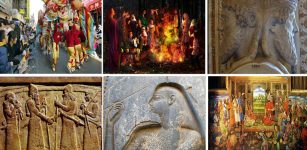 Ancient History Of New Year’s Celebrations And Traditions From Around The World
Ancient Traditions And Customs | Dec 31, 2017
Ancient History Of New Year’s Celebrations And Traditions From Around The World
Ancient Traditions And Customs | Dec 31, 2017 -
 Mysterious Jade Cong – Perplexing Ancient Chinese Artifact
Featured Stories | Jan 3, 2023
Mysterious Jade Cong – Perplexing Ancient Chinese Artifact
Featured Stories | Jan 3, 2023 -
 Qanats: Ancient 3,000-Year-Old Underground Irrigation Canals Invented By People Of Persia
Ancient Technology | Jul 13, 2020
Qanats: Ancient 3,000-Year-Old Underground Irrigation Canals Invented By People Of Persia
Ancient Technology | Jul 13, 2020 -
 What Were Ancient Egyptian Schools Like?
Ancient History Facts | Jul 14, 2016
What Were Ancient Egyptian Schools Like?
Ancient History Facts | Jul 14, 2016 -
 Yomi – Kingdom Of The Dead In Japan’s Native Shinto Religion
Featured Stories | Jun 7, 2021
Yomi – Kingdom Of The Dead In Japan’s Native Shinto Religion
Featured Stories | Jun 7, 2021

